Items filtered by date: October 2023
Seeing a Podiatrist for Cracked Heels
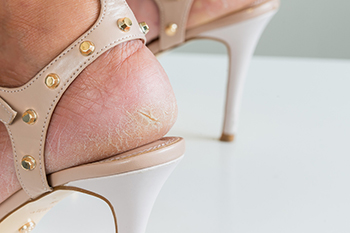
An individual would see a podiatrist for cracked heels because they are specialists in foot and ankle care, and cracked heels can be more than just a cosmetic issue. While minor heel fissures may be seen as a nuisance, severe cracks can be painful, bleed, or become infected. A podiatrist can identify the underlying causes of cracked heels, which may include biomechanical issues, skin conditions, systemic diseases, or prolonged pressure. This foot doctor can provide professional treatments such as debridement, where the hard, dead skin is removed safely, and prescribe specialized moisturizers or medicated creams. Additionally, they can offer guidance on footwear choices, recommend orthotic inserts to redistribute pressure, and offer advice on preventive measures. If you have persistent or severe cracked heels, it is suggested that you make an appointment with a podiatrist to ensure they are cared for and to avoid complications.
If the skin on your feet starts to crack, you may want to see a podiatrist to find treatment. If you have any concerns, contact Dr. Mark Gagnon from Advanced Podiatry. Our doctor can provide the care you need to keep you pain-free and on your feet.
Cracked Heels
It is important to moisturize your cracked heels in order to prevent pain, bleeding, and infection. The reason cracked heels form is because the skin on the foot is too dry to support the immense pressure placed on them. When the foot expands, the dry skin on the foot begins to split.
Ways to Help Heal Them
- Invest in a good foot cream
- Try Using Petroleum Jelly
- Ease up on Soaps
- Drink Plenty of Water
Ways to Prevent Cracked Heels
- Moisturize After Showering
- Skip a Shower
- Keep Shower Water Lukewarm
- Don’t Scrub Your Feet
If you are unsure how to proceed in treating cracked heels, seek guidance from a podiatrist. Your doctor will help you with any questions or information you may need.
If you have any questions, please feel free to contact one of our offices located in Crestwood, Orland Park, and Summit, IL . We offer the newest diagnostic and treatment technologies for all your foot care needs.
Foot Care Tips for Diabetics
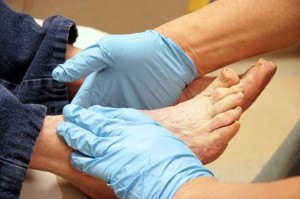
Diabetics should make it a habit to thoroughly inspect their feet daily. Pay close attention to the gaps between your toes, the soles of your feet, and your toenails. If you notice any wounds, sores, or abnormalities, consult a podiatrist promptly. Choosing well-fitting shoes and socks is vital. Ill-fitting footwear can lead to discomfort and potentially dangerous issues, especially for those with diabetic neuropathy, which causes reduced sensation in the feet. People with neuropathy may not feel the pain of a foot sore, leading to wound neglect and infection. Regularly wash your feet with warm water to keep them clean and free from dirt and pathogens. Dry them thoroughly and apply a mild moisturizer to the soles and the tops of your feet, excluding the gaps between your toes. Avoid going barefoot, even at home. Wear shoes outdoors and opt for socks when indoors to protect your feet from injury. Incorporate daily physical activity, such as walking, to boost blood circulation to your legs and feet and help to prevent diabetic neuropathy. Trim your toenails or trim them with extreme caution to avoid injuries, ingrown nails, or skin chipping. Neglected wounds can escalate to gangrene, a severe condition that may necessitate amputation. It is suggested that you make a podiatrist a part of your medical team to regularly monitor your feet' health.
Diabetic foot care is important in preventing foot ailments such as ulcers. If you are suffering from diabetes or have any other concerns about your feet, contact Dr. Mark Gagnon from Advanced Podiatry. Our doctor can provide the care you need to keep you pain-free and on your feet.
Diabetic Foot Care
Diabetes affects millions of people every year. The condition can damage blood vessels in many parts of the body, especially the feet. Because of this, taking care of your feet is essential if you have diabetes, and having a podiatrist help monitor your foot health is highly recommended.
The Importance of Caring for Your Feet
- Routinely inspect your feet for bruises or sores.
- Wear socks that fit your feet comfortably.
- Wear comfortable shoes that provide adequate support.
Patients with diabetes should have their doctor monitor their blood levels, as blood sugar levels play such a huge role in diabetic care. Monitoring these levels on a regular basis is highly advised.
It is always best to inform your healthcare professional of any concerns you may have regarding your feet, especially for diabetic patients. Early treatment and routine foot examinations are keys to maintaining proper health, especially because severe complications can arise if proper treatment is not applied.
If you have any questions please feel free to contact one of our offices located in Crestwood, Orland Park, and Summit, IL . We offer the newest diagnostic and treatment technologies for all your foot and ankle needs.
Understanding the Condition Called Neuropathy
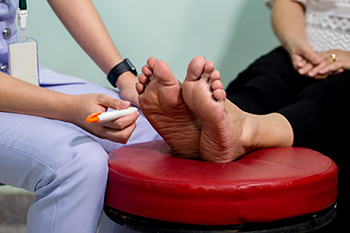
Neuropathy, often referred to as peripheral neuropathy, is a complex and often misunderstood medical condition that affects the peripheral nerves, which are responsible for transmitting signals from the brain and spinal cord to the rest of the body. This disorder disrupts the normal functioning of these nerves, leading to a range of symptoms. Neuropathy can manifest as tingling, burning, or stabbing sensations, often in the hands and feet, but it can affect other areas as well. Numbness, weakness, and muscle atrophy may occur over time. The condition can be caused by various factors, including diabetes, certain medications, and infections, in addition to genetic predispositions. Managing neuropathy involves addressing the underlying cause if known, and alleviating symptoms. Treatments may include medication to manage pain and lifestyle adjustments to prevent further nerve damage. Understanding neuropathy is the first step in seeking appropriate care and support for those affected by this challenging condition. If you are experiencing symptoms of neuropathy, it is suggested that you schedule an appointment with a podiatrist who can accurately diagnose and treat this condition.
Neuropathy
Neuropathy can be a potentially serious condition, especially if it is left undiagnosed. If you have any concerns that you may be experiencing nerve loss in your feet, consult with Dr. Mark Gagnon from Advanced Podiatry. Our doctor will assess your condition and provide you with quality foot and ankle treatment for neuropathy.
What Is Neuropathy?
Neuropathy is a condition that leads to damage to the nerves in the body. Peripheral neuropathy, or neuropathy that affects your peripheral nervous system, usually occurs in the feet. Neuropathy can be triggered by a number of different causes. Such causes include diabetes, infections, cancers, disorders, and toxic substances.
Symptoms of Neuropathy Include:
- Numbness
- Sensation loss
- Prickling and tingling sensations
- Throbbing, freezing, burning pains
- Muscle weakness
Those with diabetes are at serious risk due to being unable to feel an ulcer on their feet. Diabetics usually also suffer from poor blood circulation. This can lead to the wound not healing, infections occurring, and the limb may have to be amputated.
Treatment
To treat neuropathy in the foot, podiatrists will first diagnose the cause of the neuropathy. Figuring out the underlying cause of the neuropathy will allow the podiatrist to prescribe the best treatment, whether it be caused by diabetes, toxic substance exposure, infection, etc. If the nerve has not died, then it’s possible that sensation may be able to return to the foot.
Pain medication may be issued for pain. Electrical nerve stimulation can be used to stimulate nerves. If the neuropathy is caused from pressure on the nerves, then surgery may be necessary.
If you have any questions, please feel free to contact one of our offices located in Crestwood, Orland Park, and Summit, IL . We offer the newest diagnostic and treatment technologies for all your foot care needs.
Psychological Impact of a Broken Toe on Athletes
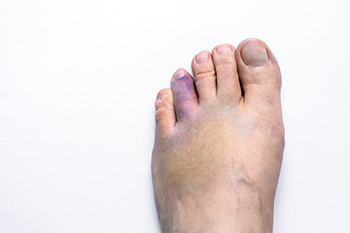
Besides the physical impact of broken toes, they can take a profound psychological toll on athletes because they rely heavily on their feet for mobility. While many dismiss a broken toe as a minor inconvenience, for athletes, it can signify missing crucial games, falling behind in training, or even questioning the longevity of their career. It is a medical setback that should be tended to by a podiatrist and requires coping mechanisms such as mindfulness and visualization. If you are an athlete who has broken your toe, it is suggested that you make an appointment with a podiatrist for treatment and support for your overall well-being.
Broken toes may cause a lot of pain and should be treated as soon as possible. If you have any concerns about your feet, contact Dr. Mark Gagnon from Advanced Podiatry. Our doctor will treat your foot and ankle needs.
What Is a Broken Toe?
A broken toe occurs when one or more of the toe bones of the foot are broken after an injury. Injuries such as stubbing your toe or dropping a heavy object on it may cause a toe fracture.
Symptoms of a Broken Toe
- Swelling
- Pain (with/without wearing shoes)
- Stiffness
- Nail Injury
Although the injured toe should be monitored daily, it is especially important to have a podiatrist look at your toe if you have severe symptoms. Some of these symptoms include worsening or new pain that is not relieved with medication, sores, redness, or open wounds near the toe.
If you have any questions, please feel free to contact one of our offices located in Crestwood, Orland Park, and Summit, IL . We offer the newest diagnostic and treatment technologies for all your foot care needs.
What Is Laser Therapy for Fungal Nails?
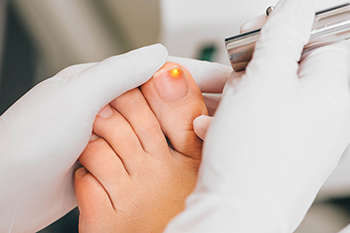
Laser therapy for fungal nails is an innovative treatment approach gaining popularity in the realm of podiatry. This non-invasive procedure harnesses the power of laser light to target and eliminate the fungal infection affecting the toenails. The laser's heat destroys the fungal cells while leaving the surrounding healthy tissue unharmed. This treatment is often preferred over oral antifungal medications as they can have side effects and may require prolonged use. One of the key advantages of laser therapy is its quick and virtually painless nature. Most patients require multiple sessions for optimal results, and there is typically no downtime after each session. Although laser therapy for fungal nails shows promise, it may not be effective for all cases, and results can vary from person to person. Ultimately, the goal is to restore healthy, clear nails and enhance overall foot health. If you have developed toenail fungus, it is strongly suggested that you contact a podiatrist who can determine if laser therapy is the correct treatment method for you.
Laser treatment can be an effective way to get rid of toenail fungus. If you have any questions about laser treatment, consult with Dr. Mark Gagnon from Advanced Podiatry. Our doctor will assess your condition and provide you with quality treatment for fungal nails.
What Are Toenail Fungal Infections?
Onychomycosis, or fungal infection of the nail, is a relatively common and non-serious condition. Around 10 percent of U.S. citizens are afflicted with fungal nails. Common forms of fungus that infect the nail include dermatophytes, yeasts, and molds.
Symptoms of Toenail Fungal Infections Include:
- Nail thickening
- Brittleness of the nail
- Discoloration of the nail
Diagnosis for Fungal Nails
Fungal infections are diagnosed by fungal culture and microscopy. This will rule out any other conditions such as nail trauma, psoriasis, lichen planus, and onychogryphosis.
What Is Laser Treatment?
Laser treatment is a non-invasive, safe, quick, and painless procedure that uses the heat from a laser to kill fungus in the nail. Each infected nail is targeted with a laser for several minutes. The treatment is usually utilized several different times over a select period. During this time, a podiatrist will keep an eye on the infection.
If you have any questions, please feel free to contact one of our offices located in Crestwood, Orland Park, and Summit, IL . We offer the newest diagnostic and treatment technologies for all your foot care needs.

